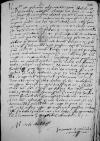Letter #827
Ioannes DANTISCUS to Sigmund von HERBERSTEINCracow, 1532-09-03
Manuscript sources:
Prints:
| ||||||
Text & apparatus & commentaryPlain textText & commentaryText & apparatus
Magnifico domino
Magnifice et plurimum observande Domine, salutem et omnis felicitatis accessum.
Accepi
Alia non restant, quam quod me veteri in me Magnificentiae Vestrae benevolentiae commendo et rogo, si qua in re Magnificentiae Vestrae usui esse et inservire possim, iubeat. cf. Verg. A. II, 707 ⌊Ipse subibo humeris, nec me labor iste gravabitcf. Verg. A. II, 707 ⌋[9].
Ex
Magnificentiae Vestrae deditissimus
[1] cf. C. ID No. 12, footnote 1.
[4] cf. C. ID No. 23, footnote 4.
[5] Karl Kuczer (Cotzer, Kukier) (d. 1538), merchant, supplier to the royal court, Cracow councillor (1524), mayor of Cracow (1524, 1525, 1534, 1536, 1537), tariff administrator of Ferdinand I in Hungary, the Habsburgs’ agent in Cracow (Noga, p. 322).
[6] Jan Łaski the younger (Joannes a Lasco) (1499-1560), nephew of Primate of Poland Jan Łaski, humanist, friend of Erasmus of Rotterdam, provost in Gniezno and Łęczyca (1525), royal secretary (1521-39), from 1529 together with his brother Hieronim he was a diplomat in the service of János I Zápolya who appointed him the bishop of Veszprem(1530) (cf. AT, XII, No. 285, p. 261, No. 340, p. 311, No. 393, p. 376). He broke from the Roman Church in 1539, and in 1540 in Frisia became involved in Reformation activity which he continued in England (contributing significantly to the reform of the Anglican Church) and then in Poland, where he returned in 1556 to build the organizational foundations of the Polish Reformed Church.
[7] Dantiscus returned to Cracow from Regensburg on July 28, 1532 (cf. C. ID No. 23, footnote 2). At this time, Jan Łaski the younger was in Cracow, having just returned from Upper Hungary, from where he brought news of Suleiman I’s campaign (see Jan Łaski’s letter to Andrzej Krzycki, Cracow, July 29, 1532, AT, XIV, No. 362, p. 554-556, cf No. 357, p. 548-550). At the time when Dantiscus was writing the mentioned letter, Łaski was already back in Kežmarok (see AT, XIV, No. 405, p. 603-604).
[8] Definitely a reference to the Turks; Dantiscus used this quote in other letters as well, e.g. in his letter to Bona of April 22, 1527, AT, IX, No. 129, p. 135: Hoc senex iste bonus pro fidelibus suis servitiis promeruit, ut multis debitis implicitus sic hinc demitteretur; videbunt forsan aliquando, in quem transfixerunt.
[9] This quote also appears in other letters by Dantiscus, including a letter of 1529 to Piotr Tomicki (AT, XI, No. 443, p. 330-1) and a letter to Piotr Opaliński of 1537 (CEID, I, 1, No. 17, p. 185).


 OSK, Fol. Lat. 258, f. 202v
OSK, Fol. Lat. 258, f. 202v